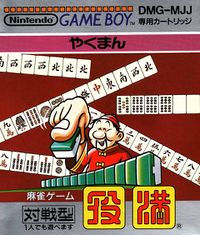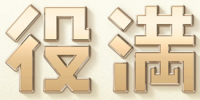| Site Notice |
|---|
|
We have a limited coverage policy. Please check our coverage page to see which articles are allowed. |
Difference between revisions of "Yakuman"
(→Summary) |
Trig Jegman (talk | contribs) m |
||
| Line 12: | Line 12: | ||
*[https://nindb.net/gb/yakuman/index.html NinDB] | *[https://nindb.net/gb/yakuman/index.html NinDB] | ||
{{clear}} | {{clear}} | ||
| − | {{ | + | {{Yakuman series}} |
{{stub}} | {{stub}} | ||
[[Category:Game Boy games]] | [[Category:Game Boy games]] | ||
[[Category:Game Boy launch titles]] | [[Category:Game Boy launch titles]] | ||
Revision as of 15:01, 12 August 2023
| Yakuman | ||||||||||||||
| 役満 | ||||||||||||||
| ||||||||||||||
| ||||||||||||||
| ||||||||||||||
|
Yakuman is a game for Game Boy. It was only released in Japan and was one of the console's launch titles.
Summary
The game is a two player variation of Japanese (riichi) mahjong. The aim of the game is to either have a higher score than your opponent, or cause their score to go below zero, ending the game. This is done by drawing, calling, and discarding tiles to complete a winning hand, incorporating one or more win conditions (yaku) into the hand. The player can play against the computer or compete with another player using the Game Link Cable.
Release data
- Mani (an officially licensed Nintendo Hong Kong distributor) released the 4 in 1: Tetris, Tennis, Alleyway, Yakuman. It included this game and the others in one special M161 Game Boy Game Pak. Other 4 in 1 Game Paks were available for non-Nintendo intellectual property.
References
| This article is a stub. You can help NintendoWiki by expanding it. |

